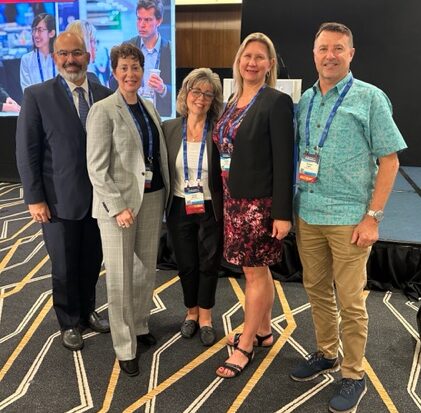Author: GO2 for Lung Cancer’s Specialist, Science & Research, Brittney Nichols MPH, BSN-RN
The IASLC annual World Conference on Lung Cancer (WCLC) unites lung cancer professionals from across the world to connect and share insights. This goes beyond the science and medicine of treating and diagnosing lung cancer—it expands to also include person-focused subjects such as stigma, inequity, and a person-centric model of care.
People first
Focusing on a person, not a patient, and the unique needs and experiences that make an individual who they are, was a core issue this year.
-

The Epidemiology of Young Lung Cancer study team at WCLC
In the opening session, Dr. Gary Rodin of the University of Toronto shared details of the Canadian SuNDAE program, focusing on the psychosocial needs of people with cancer.
- U.S. patient advocate and lung cancer survivor Jill Feldman spoke on the uptake of the IASLC Language Guide and viewing people as a person first, not a patient.
- UC Davis’ Dr. Gandara presented on the EMPOWER-Lung trial’s use of patient reported outcome measures, giving people with cancer the opportunity to identify trial outcomes and endpoints that were meaningful for them.
- GO2’s own Heather Law, MA showcased early results of the Lung Cancer Registry’s Caregiver Survey, providing perspectives from loved ones and caregivers for a person with lung cancer.
Speaking the same language
When a person or someone they love is diagnosed with lung cancer, it can feel as though you must learn a new language just to understand the different documents and forms shared with you. Making this easier to understand was the subject of several WCLC sessions.
- Dr. Singhi of MD Anderson presented their pilot study to simplify clinical trial information by providing patient friendly (and approved) clinical trial summaries to people considering participation in research. Learn more about clinical trial participation.
- GO2’s own Andrew Ciupek, PhD highlighted a project geared towards transforming patient biomarker reports from complex multi-page documents into a single page summary of important takeaways and actionable options. Learn more about biomarker testing.
- GO2’s own Maureen Rigney, LICSW, shared education on how to provide positive and impactful information on lung cancer screening, as well as a few examples of what not to do.
Equity for all
We’re well aware of the importance of engagement in lung cancer screening and participation in clinical trials, yet these gold standards of care aren’t equally accessible. Experts at WCLC shared their thoughts on who is being left behind and how to ensure they receive equal access to care.
- Dr. Narjust Florez of Dana Farber Cancer Institute spoke on the need for healthcare providers to collaborate with their communities to ensure equal low-dose CT screening for women and minorities, sharing the belief that it will take all of us working together to make this meaningful change.
- This was further echoed by Monica Baskin, PhD of the University of Pittsburgh, who presented on disparate screening uptake among African Americans in the southern United States. She also addressed the impact that community health workers can make, as shown by GO2’s ongoing ALCASE project.
- The National Comprehensive Cancer Network recommends that all people with cancer participate in a clinical trial, yet only 8% do. Most of these participants are white, meaning results may not be as easily applied to people from other ethnicities. Ireland’s Anne Marie Baird, PhD, discussed the barriers people face that contribute to this, the resulting lack of fairness and access, and how outreach, industry partnerships, and advocacy work can move the needle for more diversity in clinical trials. Learn more about the importance of representation in clinical trials.

Leave A Comment